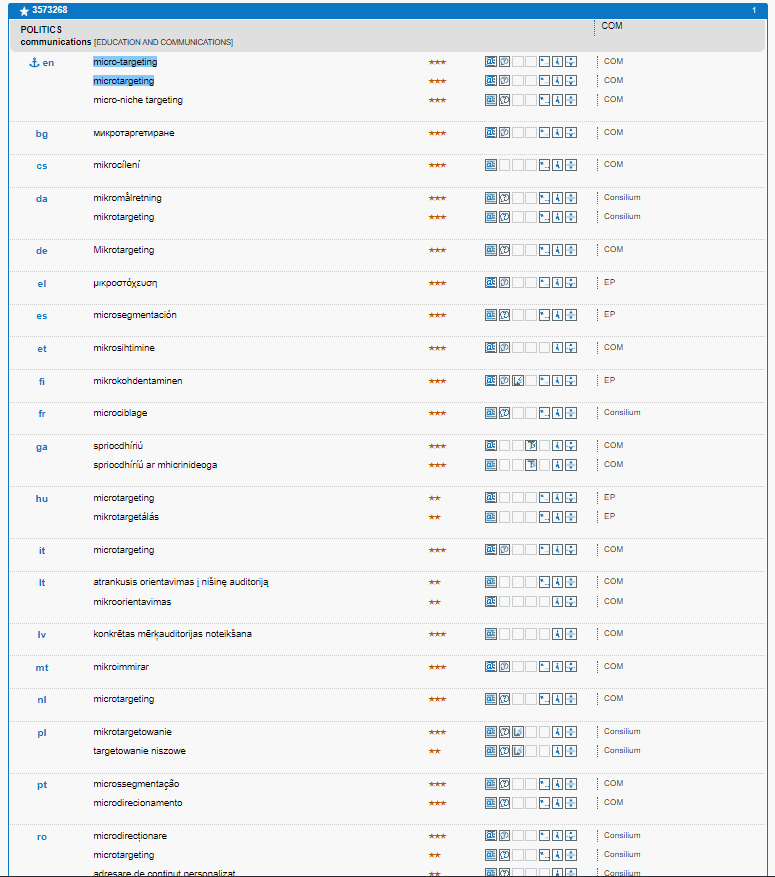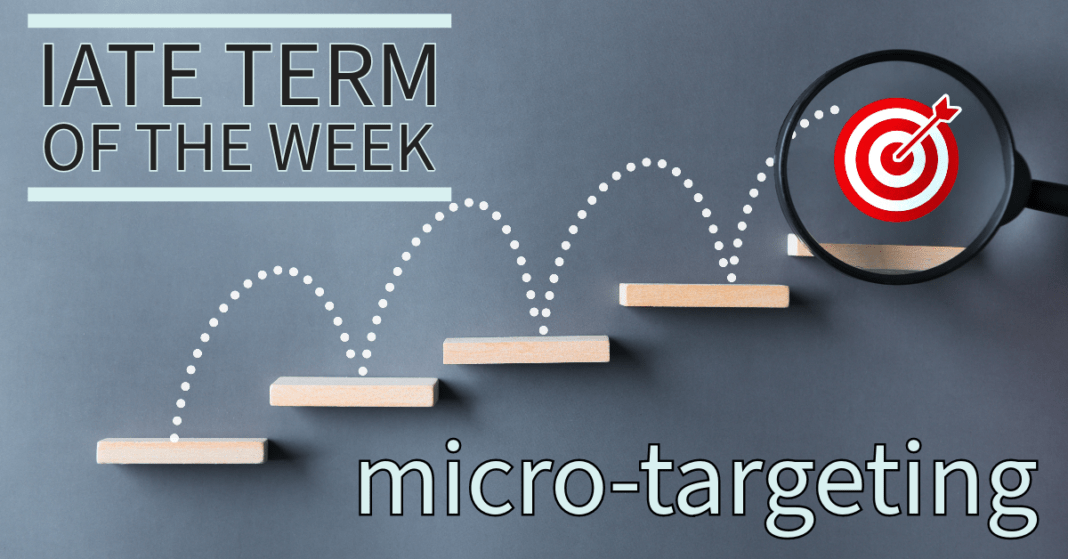Micro-targeting is a marketing strategy that uses consumer data and demographics to identify the interests of specific individuals or very small groups of like-minded people and to deliver tailored content to them. Over the years, it has become a widespread practice, particularly in political campaigning and online advertising, harnessing the power of social media platforms and big data analytics. In IATE, this term is defined as a “marketing strategy that uses consumer data and demographics to identify the interests of specific individuals or very small groups of like-minded individuals and influence their thoughts or actions”.

The European Union (EU) has been at the forefront of developing policies and legislation to protect the rights of individuals in this data-driven age, particularly in relation to micro-targeting. The General Data Protection Regulation (GDPR), which came into force in 2018, plays a crucial role here. It requires all data collection to be done with the explicit consent of users, limiting the unfettered use of personal data for micro-targeting. Failure to comply can result in significant penalties, underlining the importance of user privacy and consent.
In addition, the proposed Digital Services Act (DSA) and Digital Markets Act (DMA) will strengthen these protections. The DSA aims to increase the transparency obligations of online platforms, particularly in relation to their advertising practices. Users should know why they are shown certain ads, which directly addresses the practice of micro-targeting.
However, while these rules aim to protect user data, they also need to consider the potential impact on the digital economy, which relies heavily on targeted advertising. The EU’s legislative approach is therefore evolving and must strike a delicate balance between user privacy, market innovation and freedom of expression.
In summary, the EU’s policies and legislation are shaping the practice of micro-targeting, highlighting the need for user consent, transparency, and accountability in data-driven marketing strategies. As the digital world evolves, these laws are expected to adapt accordingly, setting global precedents for digital rights and data protection.
Bibliography
EDPS. (2022). Online targeting for political advertising: stricter rules are necessary. Retrieved from European Data Protection Supervisor: https://edps.europa.eu/press-publications/press-news/press-releases/2022/online-targeting-political-advertising-stricter_en
European Comission. (2023). MEPs toughen rules on political advertising. Retrieved from News: https://www.europarl.europa.eu/news/en/press-room/20230123IPR68616/meps-toughen-rules-on-political-advertising
Lomas, N. (2022). Europe’s top privacy regulator calls for ban on political microtargeting. Retrieved from https://techcrunch.com/2022/01/21/edps-calls-for-political-microtargeting-ban/?guccounter=1&guce_referrer=aHR0cHM6Ly93d3cuZ29vZ2xlLmNvbS8&guce_referrer_sig=AQAAAGv_B5nmIdGv_NfD-zqTDJqHWysspGKRZ1Wrmn2pno-zNHsiTo7FlUSE-5sHxUZjw8ke_gLzmHOf14Ea3eKMQ4fpw0smV8o
NOYB. (2023). Political microtargeting on Facebook: an election promise just for you! Retrieved from https://www.google.com/url?sa=t&rct=j&q=&esrc=s&source=web&cd=&cad=rja&uact=8&ved=2ahUKEwiiiLny0b2AAxWS-aQKHfIMDGkQFnoECBAQAQ&url=https%3A%2F%2Fnoyb.eu%2Fen%2Fpolitical-microtargeting-facebook-election-promise-just-you&usg=AOvVaw1W9is0qVtJaFy7sQqmH4Zp&opi
Written by Carmen del Campo Hermida

Born in Madrid, Spain, Carmen holds a Double Degree in Translation and Interpreting and Bachelor in Global Communication. She has also studied a Degree on Content Marketing and Social Media. She has been combining her studies with some part-time jobs, which has allowed her to appreciate little things in life, such as spending time with her family and friends and enjoying her hobbies. She is keen on learning from other people and cultures and wishes to get to travel around the world someday.

